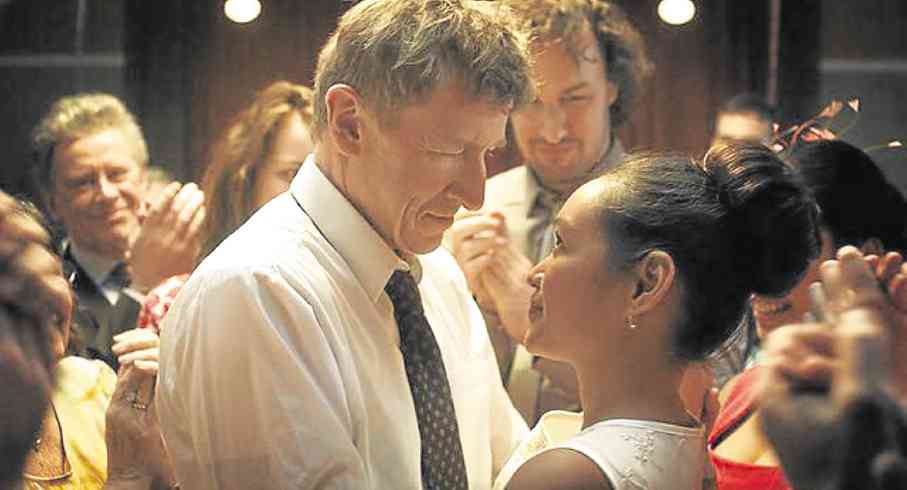MERCEDES Cabral is over the moon that her biggest movie so far, Frederikke Aspock’s “Rosita,” will be shown in a local cineplex, as the opening and closing film of the 2nd Danish Film Festival.
“I am surprised and honored,” she told the Inquirer. “I’ve been waiting for so long for the film to be shown here. I’m excited.”
“Rosita” is one of 11 films that will be showcased at the Danish film fest, set at the Shangri-La Plaza mall from Sept. 29 to Oct. 2. (“Rosita” made its local debut at the Cinemalaya fest last August.)
Cabral, who shares the screen with Denmark’s top thespians (Jens Albinus and Mikkel Boe Følsgaard) in “Rosita,” is not the only one who’s thrilled about the acclaimed film’s Manila screening.
Amb. Jan Top Christensen is just as elated: “We were lucky to get it because it’s new and won best director at the Moscow International Film Festival last year.”
The ambassador told the Inquirer that the fest’s goal is “to spread information on, and interest in, Danish cinema.” “Our films offer something different,” he remarked. “It’s a distinct Danish flavor… a more realistic approach to storytelling.”
A perfect example is “Rosita,” Cabral and Christensen pointed out. In the film, she portrays a mail-order bride who’s torn between her husband and his son.
“The characters in Danish films are complex human beings with strengths and weaknesses,” Christensen asserted.
Cabral related that the Danish film industry is quite dynamic. “It’s pretty big.”
“Only six million people speak the Danish language. To be competitive abroad, we need to offer quality films,” he noted.
For an industry with a modest market, Danish cinema has produced several world-class talents who work in front of and behind the camera in international productions.
Its most famous export is Cannes-winning actor Mads Mikkelsen of the TV series, “Hannibal.” But Denmark was also able to penetrate the rarefied world of “Game of Thrones,” through Nikolaj Coster-Waldau, who plays Jaime Lannister in the Emmy-winning fantasy show.
Speaking of the Emmys, Danish filmmaker Susanne Bier recently won best director for the espionage series, “The Night Manager,” Christensen reported.
Albinus, Cabral’s costar in “Rosita,” is in the cast of Lars von Trier’s “Nymphomaniac,” with Shia LeBoeuf and Uma Thurman.
Cabral herself got an offer to do a film in the United States. “There was an inquiry, but the script is still being finalized. It’s set in Austin, Texas. I will also play a mail-order bride, but the story is darker,” she said.
“Rosita” can well be her ticket to Hollywood and beyond. She said, “It was a big boost for me. It’s now being shown not just in Europe, but in other countries, as well.”
What is the Danish film industry’s secret in making waves internationally?
Christensen presented a theory that could be summed up in two words: “Government support.”
“There are two important institutions: the National Film School of Denmark and the Danish Film Institute,” he said.
The former makes sure that Danish film professionals are properly trained, while the latter cofinances and helps distribute movies. “The national film school only takes in six people per course … intensive four-year courses,” the ambassador clarified.
“How I wish we have something like that in the country,” Cabral mused. “In Denmark, you cannot become an actor unless you undergo training in school. Here, if you are beautiful or handsome, you can get discovered in a reality show.”
The director of “Rosita” is a product of the national film school, Christensen quipped.
He explained that whether the initiative is led by government or the private sector, what is vital is that there should be “long-term prospective financing … in order for filmmakers to make long-term plans.”
The proof of the pudding? All of the 11 films in the Danish film fest lineup have either won or been nominated in high-profile festivals: Ask Hasselbach’s “Antboy: Revenge of the Red Fury” (Berlin 2014), Charlotte Sachs Bostrup’s “Karla’s World” (Robert Festival 2007), Christina Rosendahl’s “The Idealist” (Beijing 2015), Bille August’s “Silent Heart” (San Sebastian 2014), Mikkel Norgaard’s “The Keeper of Lost Causes” (Palm Springs 2013), Kasper Barfoed’s “The Candidate” (Robert Festival 2008), Christoffer Boe’s “Sex, Drugs & Taxation (Chicago 2013), Soren Kragh-Jacobsen’s “The Hour of the Lynx” (Tallinn Black Nights 2013), Kristian Levring’s “Fear Me Not” (Mar del Plata 2008), Paprika Steen’s “With Your Permission” (Toronto 2007) and “Rosita” (Moscow 2015).


